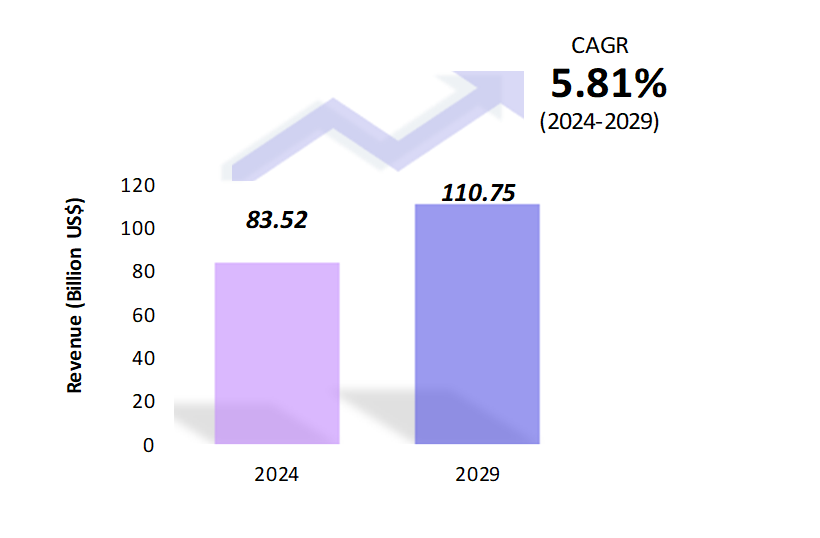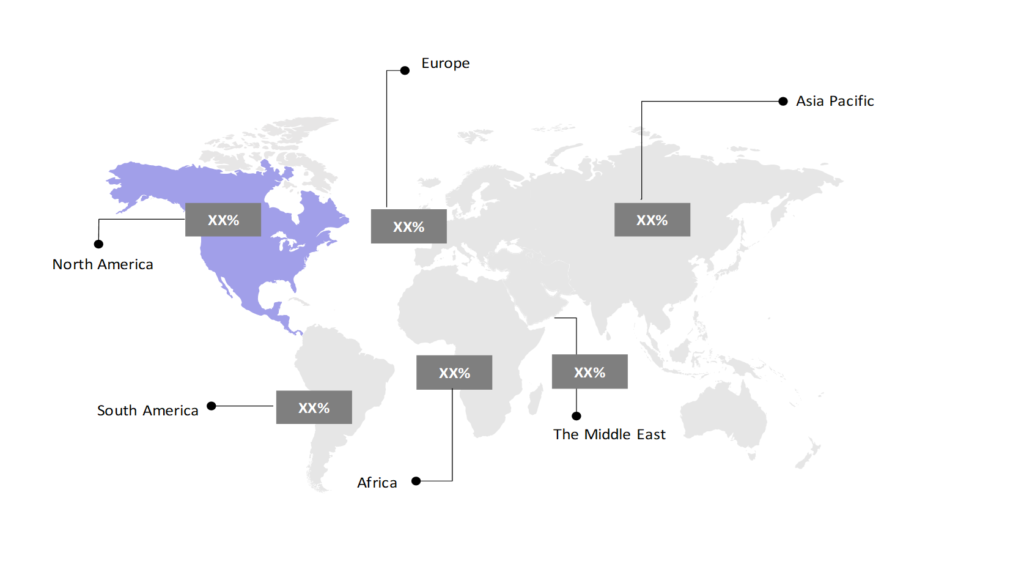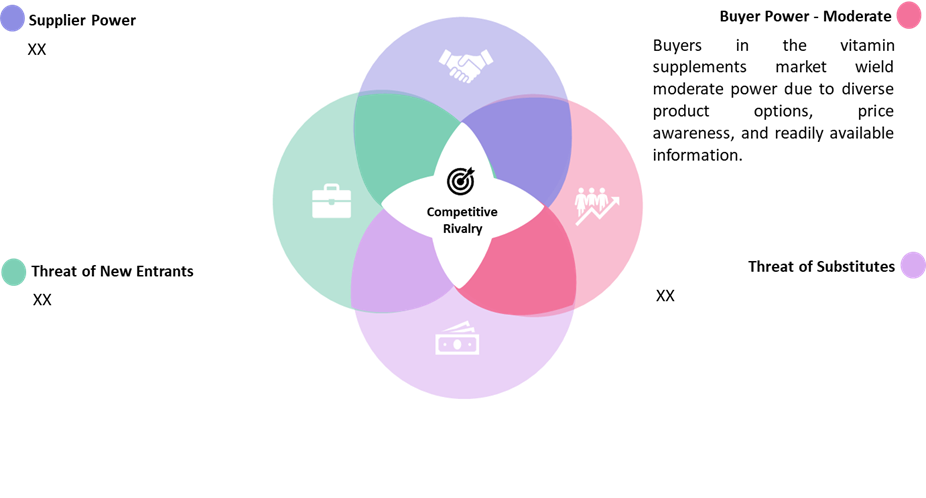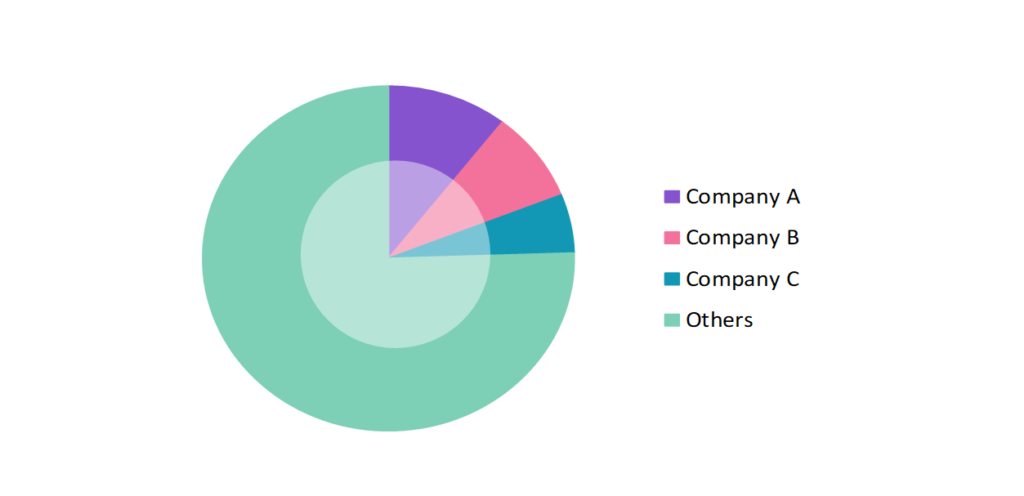Vitamin Supplements Market Insights: Size, Share, Growth Analysis & Forecast (2024-2029)
The report covers a comprehensive analysis segmented by Type (Vitamin A, Vitamin B, Vitamin C, Vitamin D, Vitamin E, Vitamin K, Multivitamin), by Form (Tablet, Powder, Capsule, Gummies, Others), by Distribution Channel (Supermarkets and hypermarkets, Retail Pharmacy, Online Sales, Others), By Geography (North America, South America, Asia Pacific, Europe, The Middle East, Africa).
Vitamin Supplements Market Snapshot

Vitamin Supplements Market Overview
The global vitamin supplements market is estimated to be at $83.52 Bn in 2024 and is anticipated to reach $110.75 Bn in 2029. The global vitamin supplements market is registering a CAGR of 5.81% during the forecast period 2024-2029. Vitamin supplements deliver essential vitamins that may be lacking in a regular diet. These vitamin supplements are available in various forms, such as tablets, capsules, milkshakes, liquids, and gummies. These supplements prevent or address vitamin deficiencies, support overall health, and enhance specific physiological functions.. The vitamin supplements market provides consumers with a wide range of products aimed at improving overall health and well-being through convenient and accessible supplementation. With an increasing emphasis on preventive healthcare and wellness, the demand for vitamin supplements continues to grow globally. The aging population’s need for solutions to age-related health issues, the expanding trend of self-care and proactive health management, and consumers’ growing health consciousness are all factors contributing to the rise of the vitamin supplement industry.
Additionally, the COVID-19 pandemic has increased public awareness of immune health, which has resulted in a spike in demand for supplements that include components that strengthen the immune system, such zinc, vitamins C, and D. Products on the market cover a wide range of topics: multivitamins; single-nutrient supplements; herbal supplements; and specialty formulations that address certain health issues like joint support, cognitive performance, and bone health. Novel forms of administration, like liquids, powders, and gummies, accommodate different consumer tastes and lifestyles.
Nevertheless, the market for vitamin supplements also has to contend with issues including complicated regulations, customer price sensitivity, safety concerns, and supply chain interruptions. Businesses need to overcome these obstacles by making investments in R&D, making sure regulations are followed, preserving product quality and safety, and encouraging open communication with customers.
Overall, the market for vitamin supplements offers enormous growth potential to businesses that can successfully meet customer needs, innovate with fresh product formulations and delivery strategies, and adjust to changing consumer preferences and legal constraints.
Vitamin Supplements Market Coverage
| Historical & Forecast Period | 2018-2029 |
| Base Year | 2023 |
| Forecast Period | 2024-2029 |
| Units | Billion US$ |
| Segments | Type, Form, Distribution Channel |
| Geographies | North America, South America, Asia Pacific, Europe, the Middle East, Africa |
| Key Vendors | Bayer AG, Koninklijke DSM N.V., Amway Corp., NuLeaf Naturals, LLC, Herbalife Ltd. |
Key Geographies of Vitamin Supplements Market, 2023

Porter’s 5 Forces Analysis of Vitamin Supplements Market

Vitamin Supplements Market Trends
Expectations for complete supply chain transparency are rising. Customers are interested in learning about the ethical standards of manufacturing, the origins of ingredients, and the processing methods used. In response, brands are disclosing specifics about their sourcing and production procedures.
There is a growing need for vitamin supplements made without components originating from animals because of the popularity of plant-based diets and vegan lifestyles. To meet the needs of this burgeoning market group, businesses are adding plant-based and vegan options to their existing product lines. For instance, in September 2018, Garden of Life has introduced herbal supplements in collaboration with actress Alicia Silverstone. These supplements, which are derived from organic fruits and vegetables such as celery, broccoli, spinach, and Brussels sprouts, achieve multiple certifications, including USDA Organic, Non-GMO Project Verified, Gluten Free, and Vegan, and contain none of the fillers and synthetics often found in supplements.
Eco-friendly packaging solutions are gaining traction as consumers seek to reduce their environmental footprint. To reduce waste and pollution, businesses are implementing packaging materials that are recyclable, biodegradable, and compostable. Reusable or refillable packaging choices are also being used by some to further encourage sustainability. For instance, US-based company Nature’s Way, which sells vitamins and supplements, has unveiled a range of environmentally friendly packaging choices for its herbal product line. To make the bottles, the company collaborated with international packaging company TricorBraun. 97% of the plastics used in the packaging line are post-consumer recycled (PCR).
The clean label movement, which emphasizes simplicity and transparency in product ingredients, is influencing the vitamin supplement market. Consumers are seeking products with minimal additives, artificial colors, and preservatives. Companies are reformulating their products to meet these preferences and highlighting clean label claims on packaging. For example, MegaFood has revamped its product formulations to align with consumer preferences for cleaner ingredients. They have eliminated artificial colors, flavors, and preservatives from their supplements and focused on using whole foods and natural sources for their nutrients.
Regenerative agricultural methods, which aim to improve soil health, biodiversity, and ecosystem resilience, are being investigated by certain businesses. Vitamin supplement companies seek to minimize their impact on the environment while promoting sustainable agriculture through their support of regenerative farming practices. On this note, Gaia Herbs has implemented regenerative farming methods in cultivating herbs used in their supplements, focusing on restoring soil health and biodiversity. They prioritize practices such as crop rotation, cover cropping, and minimal tillage to promote soil regeneration and enhance ecosystem resilience.
Overall, the latest trend in the vitamin supplement market revolves around sustainability, transparency, and ethical sourcing, reflecting consumers’ growing concerns about health, the environment, and social responsibility.
Vitamin Supplements Market Driving Factors
Increasing awareness of the importance of nutrition and preventive healthcare drives demand for vitamin supplements. Consumers are proactively seeking products to support overall health, immunity, and specific wellness goals. The global aging population, coupled with a growing focus on healthy aging, creates a substantial market for vitamin supplements that target age-related health concerns such as bone health, cognitive function, and joint support. For instance, in March 2024, French company Activ’Inside introduced a new joint-focused supplement called AiFlex’inside. This product targets both athletes and the aging populations.
Moreover, the COVID-19 pandemic heightened interest in immune-boosting supplements, which led to a surge in demand for vitamins C, D, and zinc. This trend is expected to persist as consumers prioritize immunity support. For instance, Amway’s Nutri lite brand saw a spike in sales of its Immunity Defense line of products, which combine zinc with a combination of vitamins C and D. Nutrient deficiencies are a result of busy lifestyles, demanding schedules, and dietary preferences (vegan, vegetarian, etc.), which makes supplements necessary to fill up nutritional gaps.
Furthermore, the proliferation of e-commerce platforms has expanded market access, allowing consumers to conveniently purchase vitamin supplements online. This driver is particularly significant in reaching a wider audience, including those in remote areas. For instance, a variety of vitamin supplements are available for convenient online purchase and doorstep delivery from Vitacost, an online supplier of health and wellness items. This accessibility is especially helpful for customers who live in distant places where it may be difficult to visit physical establishments that sell vitamin supplements.
Additionally, Companies continually innovate by introducing new formulations, delivery methods, and combination products to cater to evolving consumer preferences and health trends. This includes personalized vitamins, gummies, and fortified beverages. For example, Ritual, a brand focused on women’s vitamins, has created a capsule with delayed-release technology to improve nutrient absorption and reduce stomach discomfort. Additionally, digital channels give consumers the ability to make informed decisions about vitamin supplements. Companies that offer clear and transparent information on product labels, websites, and marketing materials can build consumer trust and loyalty.
Vitamin Supplements Market Challenges
The market for vitamin supplements is confronted with various obstacles that hinder its expansion and advancement. Complying with the strict guidelines and quality requirements established by regulatory bodies might provide difficulties for businesses in the vitamin supplement industry. Adherence to safety rules, health claims, and labeling requirements necessitates substantial resources and knowledge. Ensuring the safety and quality of vitamin supplements is crucial, especially if they are polluted, which could pose health problems. It is imperative to uphold strict quality control protocols during manufacturing to address safety concerns and preserve consumer confidence. For example, a recall of several Japanese health supplements occurred in March 2024; as a result, over 100 hospitalizations and five fatalities were associated with such pills.
For businesses in the vitamin supplement sector, it can be difficult to strike a balance between complying with these rules and preserving consumer engagement and brand awareness. In addition, supply chain interruptions like shortages of raw materials, traffic jams, or geopolitical unrest can impact the price and accessibility of substances used in vitamin supplements.
Furthermore, businesses find it difficult to predict and adjust to changing trends due to the rapid adjustments in consumer preferences. Examples of these shifts include the move towards plant-based supplements, clean-label products, and individualized nutrition. Companies may find it difficult to align with sustainability goals while preserving product quality and affordability because of growing consumer knowledge of environmental sustainability, which may boost demand for eco-friendly packaging and materials supplied responsibly.
Given the circumstances, businesses operating in the vitamin supplement industry need to take aggressive measures to address these issues. These tactics consist of making investments in R&D, making sure regulations are followed, encouraging open contact with customers, and being adaptable in the face of market changes and trends.
Vitamin Supplements Market – Key Industry News
- In October 2023, Amway India launched a new multivitamin and multimineral supplement called Nutrilite Daily Plus. This formulation contains 24 essential vitamins and minerals, along with plant concentrates. Nutrilite Daily Plus represents Amway’s first product to feature an innovative Dual Layer Dual Release Formulation.
- The Swedish probiotic manufacturer Probi AB and consumer health and wellness company GO Healthy Group announced a collaboration in May 2023 to introduce a line of probiotic supplements in New Zealand.
Vitamin Supplements Market Competitive Landscape
A wide range of businesses vying for market dominance across different industries and regions define the competitive landscape of the vitamin supplements market. The market’s major participants span from smaller, niche firms to global conglomerates.
By utilizing their knowledge of medicine and research to create and promote supplements that address certain medical issues, pharmaceutical companies frequently have a presence in the vitamin supplement industry. For instance, in September 2022, Abbott announced the launch of the new Ensure with HMB. A clinically validated and scientifically based nutritional supplement, the New Ensure with HMB and 32 nutrients is specifically formulated to protect and develop muscles.
Nutraceutical companies specialize in the development and marketing of nutritional supplements, including vitamins and minerals. These companies often focus on natural and organic formulations, catering to consumer preferences for clean-label products. In the vitamin supplement industry, direct-to-consumer (DTC) firms have become more well-known by using digital marketing and internet platforms to connect with customers directly. To give customers convenience and customization, these firms frequently provide customized supplements and subscription-based services.
Overall, the vitamin supplement industry is characterized by a dynamic and ever-changing competitive landscape, as businesses constantly innovate to satisfy consumer needs, set themselves apart from the competition, and obtain a competitive advantage.
Vitamin Supplements Market Company Share Analysis, 2023 (%)

Vitamin Supplements Market – Key Companies

Reason to Buy from us

Table of Contents
| 1. Introduction |
|---|
| 1.1. Research Methodology |
| 1.2. Scope of the Study |
| 2. Market Overview / Executive Summary |
| 2.1. Global Vitamin Supplements Market (2018 – 2022) |
| 2.2. Global Vitamin Supplements Market (2023 – 2029) |
| 3. Market Segmentation |
| 3.1. Global Vitamin Supplements Market by Type |
| 3.1.1. Vitamin A |
| 3.1.2. Vitamin B |
| 3.1.3. Vitamin C |
| 3.1.4. Vitamin D |
| 3.1.5. Vitamin E |
| 3.1.6. Vitamin K |
| 3.1.7. Multivitamin |
| 3.2. Global Vitamin Supplements Market by Form |
| 3.2.1. Tablet |
| 3.2.2. Powder |
| 3.2.3. Capsule |
| 3.2.4. Gummies |
| 3.2.5. Others |
| 3.3. Global Vitamin Supplements Market by Distribution Channel |
| 3.3.1. Supermarkets and hypermarkets |
| 3.3.2. Retail Pharmacy |
| 3.3.3. Online Sales |
| 3.3.4. Others |
| 4. Regional Segmentation |
| 4.1. North America |
| 4.1.1. The U.S |
| 4.1.2. Canada |
| 4.1.3. Mexico |
| 4.2. South America |
| 4.2.1. Brazil |
| 4.2.2. Argentina |
| 4.2.3. Colombia |
| 4.2.4. Chile |
| 4.2.5. Rest of South America |
| 4.3. Asia Pacific |
| 4.3.1. China |
| 4.3.2. India |
| 4.3.3. Japan |
| 4.3.4. South Korea |
| 4.3.5. Rest of Asia Pacific |
| 4.4. Europe |
| 4.4.1. UK |
| 4.4.2. Germany |
| 4.4.3. Italy |
| 4.4.4. France |
| 4.4.5. Spain |
| 4.4.6. Rest of Europe |
| 4.5. The Middle East |
| 4.5.1. Turkey |
| 4.5.2. UAE |
| 4.5.3. Saudi Arabia |
| 4.5.4. Rest of the Middle East |
| 4.6. Africa |
| 4.6.1. Egypt |
| 4.6.2. South Africa |
| 4.6.3. Rest of Africa |
| 5. Value Chain Analysis of the Global Vitamin Supplements Market |
| 6. Porter Five Forces Analysis |
| 6.1. Threats of New Entrants |
| 6.2. Threats of Substitutes |
| 6.3. Bargaining Power of Buyers |
| 6.4. Bargaining Power of Suppliers |
| 6.5. Competition in the Industry |
| 7. Trends, Drivers and Challenges Analysis |
| 7.1. Market Trends |
| 7.1.1. Market Trend 1 |
| 7.1.2. Market Trend 2 |
| 7.1.3. Market Trend 3 |
| 7.1.4. Market Trend 4 |
| 7.1.5. Market Trend 5 |
| 7.2. Market Drivers |
| 7.2.1. Market Driver 1 |
| 7.2.2. Market Driver 2 |
| 7.2.3. Market Driver 3 |
| 7.2.4. Market Driver 4 |
| 7.2.5. Market Driver 5 |
| 7.3. Market Challenges |
| 7.3.1. Market Challenge 1 |
| 7.3.2. Market Challenge 2 |
| 7.3.3. Market Challenge 3 |
| 7.3.4. Market Challenge 4 |
| 7.3.5. Market Challenge 5 |
| 8. Regulatory Landscape |
| 9. Competitive Landscape |
| 9.1. Bayer AG |
| 9.2. Koninklijke DSM N.V. |
| 9.3. Amway Corp. |
| 9.4. NuLeaf Naturals, LLC |
| 9.5. Herbalife Ltd. |
| 9.6. Company 6 |
| 9.7. Company 7 |
| 9.8. Company 8 |
| 9.9. Company 9 |
| 9.10. Company 10 |
Vitamin Supplements Market – Frequently Asked Questions (FAQs)
What is the current size of the global vitamin supplements market?
The market size for the global vitamin supplements market in 2024 is $83.52 Bn.
Who are the major vendors in the global vitamin supplements market?
The major vendors in the global vitamin supplements market are Bayer AG, Koninklijke DSM N.V., Amway Corp., NuLeaf Naturals, LLC, and Herbalife Ltd.
Which segments are covered under the global vitamin supplements market segments analysis?
This report offers in-depth insights into each type, form, distribution channel.
